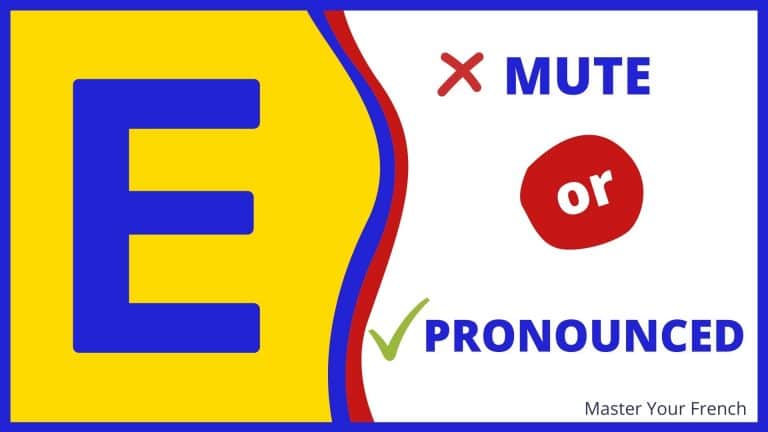The 4 rules that really matter when it comes to pronouncing the mute E in French
Updated: 8 June, 2023 by Mylene in Pronunciation Lessons ▪

For French learners, one of the main difficulties lies in the pronunciation of the letter E in French. When to pronounce E in French? When E is silent in French? The mute E is also known as “silent E” in English, “e caduc” or “e instable” in French. In the following, we’ll be using the term « mute E » as it’s also widely used in English. This lesson and its video will help you learn the right pronunciation of French words with the letter E.
In this post, you’ll discover everything that really matters when it comes to pronouncing the mute E in French:
- How to write the mute E in French
- How To Say The Mute E In French
- A Video About The French Letter E
- Rule 1: First Syllable
- Rule 2: Within A Group And Between 2 Consonants
- Rule 3: Within A Group And After 2 Consonants
- Rule 4: At The End Of A Group
How to write the mute e in French?
The phonetic symbol for mute e is /ə/. It’s always written with the letter e, for example :
There are some exceptions where the sound /ə/ is present without the letter e. For instance, the first syllable of the following words that are derived from the verb “faire”:
- bienfaisance is pronounced /bjɛ̃fəzɑ̃s/
- faisant is pronounced /fəzɑ̃/
It’s also the case in the pronunciation and spelling of the French word “monsieur”:
- monsieur is pronounced /məsjø/.
How to Say the mute e in french?
The way the vowel /ə/ is pronounced varies from one person to another. Indeed some people have very similar pronunciation for the 3 phonemes:
But one thing is mainly different: the sounds /ø/ or /œ/ are never omitted, whereas the mute E can often be omitted in French.
You need to learn the four rules below that explain everything you need to know about the mute E in French. In particular, the cases where E is:
- pronounced
- not pronounced
- dropped.
Watch the following video to learn everything you need related to the French Pronunciation of the letter E.
A Video About The Pronunciation of the French Letter E
In this video, I explain in French the four rules to pronounce, or not to pronounce, the letter E in French.
You’ll learn that, within a group, the letter E generally is pronounced if it’s preceded by at least two pronounced consonants. At the end of a word, the letter E is usually not pronounced in standard French. Follow my advice and start applying them to get the right French pronunciation.
Be sure to watch the video to learn more about the pronunciation of the letter E. To follow more updates, subscribe to the YouTube channel and follow me on Instagram.
Rule 1: Letter E in the First syllable
The letter E within the first syllable of a group is generally pronounced:
Rule 2: Letter E Within a group and between 2 consonants
If the mute E is preceded by one pronounced consonant and followed by one pronounced consonant then it is generally not pronounced. Here are some examples:
- Samedi : /samdi/
- Boulangerie : /bulɑ̃ʒʁi/
- Tranquillement : /tʁɑ̃kilmɑ̃/. Note that there are two letters “l” before the letter e. The letter “l” is only pronounced one time. So you don’t have to pronounce the mute E. On the contrary, within the word “belle”, the letter is before two Ls. The letter E is generally pronounced /ɛ/ before two consonants. “Belle” is pronounced /bɛl/.
The fall of mute E can lead to assimilation. The case occurs if the letter e is between a voiceless consonant and a voiced consonant.
- médecin : the letter e is between two pronounced consonants. In this case, the e is not pronounced. The voiceless consonant /t/ will influence the pronunciation of the voiced consonant /d/. The /d/ is then pronounced /t/, an assimilation has occurred. The word “médecin” is pronounced /metsɛ̃/ and not /medsɛ̃/.
- projeter : the letter e is between two pronounced consonants. In this case, the e is not pronounced. The unvoiced consonant /t/ will influence the pronunciation of the voiced consonant /ʒ/. The /ʒ/ is then pronounced /ʃ/, an assimilation has occurred. The word “projeter” is pronounced /pʁɔʃte/ and not /pʁɔʒte/.
Rapid speech: When To Drop The Letter E in French
In conversation, the E of the second monosyllable is frequently dropped.
- Je ne le dis pas can be pronounced “je n’le dis pas“.
- La semaine becomes la “s’maine“.
If you want to get closer to the French accent, you have to learn how to drop the letter e in the spoken language. Here’s an article where you can start reading about the pronunciation of words ending with RE/LE.
It’s also important to note that the fall of the mute e often leads to the meeting of two consonants.
No wonder French pronunciation can be difficult. Master Your French covers a wide range of topics to help French learners improve their pronunciation and grow their listening and speaking skills. Keep learning with Master Your French by taking our online French courses.
Rule 3: Letter E Within A Group And after 2 Consonants
Within a group, the mute E is pronounced if it’s preceded by two or more pronounced consonants and followed by one consonant sound.
- Inversement : /Ɛ̃vɛʁsəmɑ̃/
- Gouvernement : /guvɛʁnəmɑ̃/
- Il me l’a dit : /ilməladi/
Rule 4: Letter E at the end of a group
The mute e is usually not pronounced at the end of a group.
In the guide to silent letters in French, the vowel e is the most common letter.
Exceptions: compound words in French
At the end of the first part of compound words, the mute E is pronounced if the second word has one syllable. Here are two compound words where the letter E is pronounced.
- porte-clés : /pɔʁtəkle/. The word clé has only one syllable, you have to pronounce the lettre E.
- garde-côtes : /gaʁdəkot/
When the second word has more syllables, the pronunciation of the mute e is optional.
- porte-monnaie : /pɔʁtəmonɛ/. The word monnaie has only two syllables, the letter E can be dropped.
Note that in some regions in French, in particular the South of France, the mute E is regularly pronounced.
Sometimes we add a mute E that doesn’t exist after 2 consonants:
- Un ours blanc is pronounced /ursəblɑ̃/ : we pronounce the extra /ə/ because there are two consonants at the end of the word “ours” and two consonants at the beginning of the word “blanc”.
Keep learning
In this article, we covered the mute E and when you should pronounce the sound /ə/ or when it’s dropped. If you enjoyed the content of this article as well as the video you can also check our article on silent letters in French.


